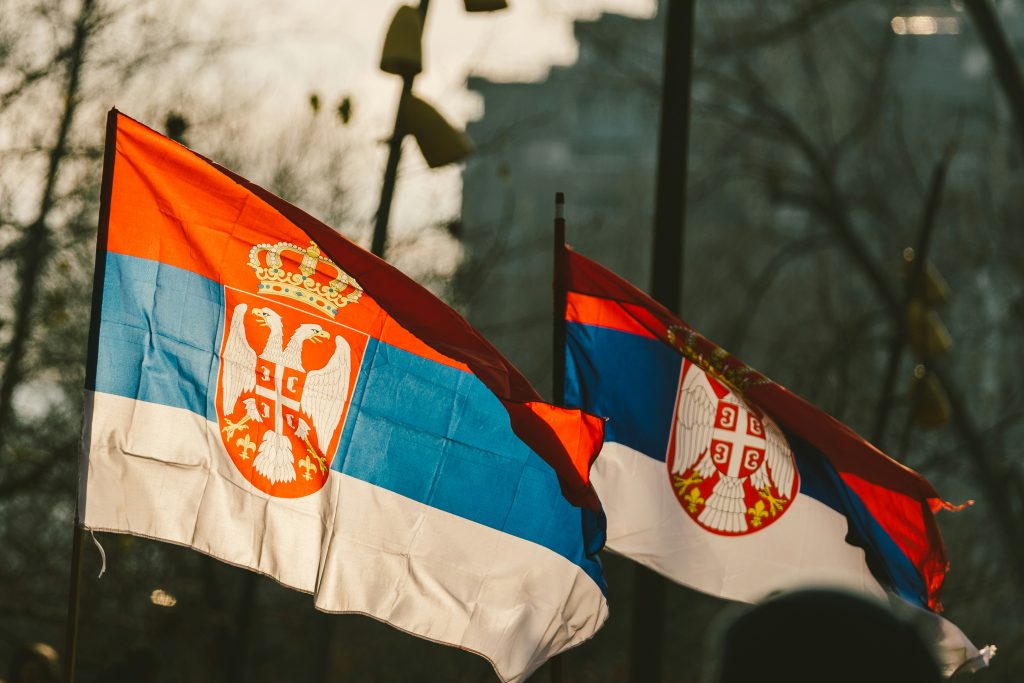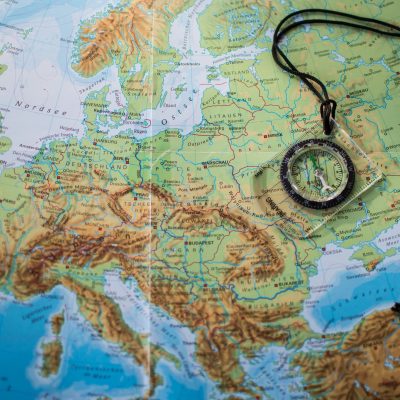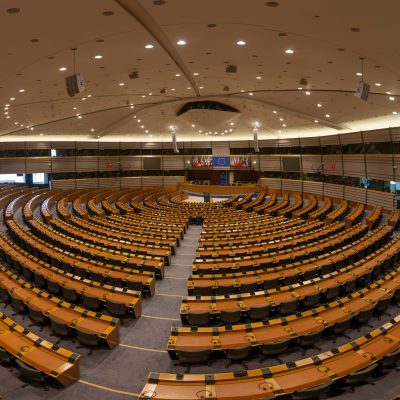Serbia and the European Union: the moment of decision

For a year now, Serbia has been living to the rhythm of an unprecedented protest movement. For the first time after more than a decade of authoritarian rule, Aleksandar Vučić’s regime appears to be faltering. The collapse of the Novi Sad railway station canopy on 1 November 2024, which claimed sixteen lives, sparked a student mobilisation, fuelled by suspicions of corruption surrounding the station’s renovation. Gradually spreading nationwide, this uprising is now shaking the foundations of a regime once thought unshakable.
Since then, hundreds of thousands of citizens across the country have taken to the streets without respite, calling for an end to a system built on corruption, clientelism, and propaganda. Even though the demonstrators do not wave the EU flag, their demands precisely echo the very values Brussels claims as its founding principles. Although often critical of the European Union — of which Serbia has been a candidate since 2012 —, some have cycled all the way to Strasbourg, others run to Brussels, seeking to make their voices heard. Their struggle, as highlighted by Commissioner for Enlargement Marta Kos, is profoundly European: a fight for justice, democracy, and the rule of law.
Yet, a year into the protests, Serbs have never felt less able to rely on their European partners, measuring the gap between the values the European Union proclaims and the complacency it shows toward a regime that tramples them. Today, Serbia is experiencing a genuine State and media capture: institutions are subjugated, the free press silenced, and the judiciary brought under control.
While the Serbian authorities tighten their grip and grow increasingly violent against their own population, European capitals remain disconcertingly passive. In the name of a regional stability that has become illusory, they turn a blind eye to a drift that day after day undermines the accession that Aleksandar Vučić still pretends to pursue — and, with it, the credibility of the enlargement process. This is a major strategic mistake: in this historic moment, such a posture amounts to tying their own image to the fate of a regime running out of breath.
The European Union, France included, now faces a choice: either to continue tolerating a regime that undermines its own interests, or to stand with the democratic aspirations of the Serbian people. Now more than ever, it must exert credible pressure on the Serbian authorities to respond seriously to the people’s demands — to call early, free and fair elections and to undertake genuine institutional reforms. Failing that, the accession process should be suspended, following the precedents set with Turkey[1] and Georgia[2]. What is at stake in Serbia today extends far beyond its borders: it is the very credibility of the European project itself.
Anatomy of a faltering regime
The movement born in Novi Sad is not a sudden outburst; it is the culmination of ten years of accumulated frustration. Previous mobilisations had already challenged those in power — opposing the Belgrade Waterfront project, the lithium mine in the Jadar Valley, the surge of public violence, or repeated electoral fraud — but none had ever succeeded in uniting the country as this one has. This protest, the largest in the country’s recent history, draws its strength from its very nature: peaceful, non-partisan, and decentralised. Originating in the universities, it has spread to every city and village, weaving together a national solidarity that the authorities had not anticipated.
Confronted with the scale of the movement, the government attempted to feign transparency by publishing, in December, a few documents related to the renovation of the Novi Sad railway station, thus pretending to answer the students’ demands. This staging merely revealed its embarrassment and powerlessness in the face of an uncontrollable uprising. Its usual methods of discrediting — accusing protesters of being manipulated by Western powers or acting as agents of a “colour revolution,” in the Kremlin’s terminology — no longer work.
Faced with a population it can no longer control, Aleksandar Vučić has plunged into an escalation denounced by the European Parliament[3] : harassment and targeted repression of protesters, journalists[4], and opponents; arbitrary arrests and detentions — including members of the Free Citizens Movement (Pokret slobodnih građana, PSG) opposition party — and widespread illegal surveillance, partly through the use of spyware.
This growing tension betrays the fear of a regime aware that to respond sincerely to popular demands — transparency in public procurement, judicial independence, and the fight against corruption and organised crime — would mean shaking the entire edifice. Aleksandar Vučić equally rejects the prospect of early parliamentary elections, knowing he would lose them in the current climate. In an increasing number of cities, his unpopularity now makes him persona non grata. Unable to restore his legitimacy, he has chosen repression over reform.
The ambiguity trap
The regime’s internal hardening is matched by a headlong rush in foreign policy. The man who once prided himself on being a master tightrope walker, able to navigate between Brussels, Moscow, Beijing, and Washington D.C., now multiplies provocations: insults directed at Members of the European Parliament, the illegal arrest and expulsion of EU citizens, or official visits to Moscow and Beijing. Alone among the Western Balkan States, Serbia still refuses to join sanctions against Russia, instead amplifying the Kremlin’s narrative aimed at discrediting the European Union.
By multiplying gestures toward Vladimir Putin, Aleksandar Vučić seeks to preserve his support, as Moscow increases energy pressure on Belgrade — heavily dependent on its Russian supplier and with its gas agreement set to expire at the end of the year. This structural dependency casts doubt on Serbia’s reliability as a candidate State while also weakening the regime itself: a winter energy crisis — whether through supply cuts or soaring prices — could shatter the illusion of stability that Aleksandar Vučić has maintained until now. By locking himself into this pattern, he jeopardises not only the country’s energy security but also its European prospects.
Ready to sacrifice his country’s EU membership for his own political survival, Aleksandar Vučić can no longer be regarded as a credible interlocutor: neither on the reforms required for accession, nor on the implementation of the Brussels–Ohrid Agreement with Kosovo, nor on the prosecution of those responsible for the Banjska attack. Faced with this deadlock, EU Member States can no longer content themselves with a policy of appeasement dictated by a handful of contracts. No attempt at compromise with Aleksandar Vučić has produced any lasting result so far; he himself has become a source of regional destabilisation.
Some voices still call for restraint, invoking the risk of greater instability on the continent, the fear of “pushing Serbia into Russia’s arms,” or of jeopardising major economic opportunities — from lithium to defence contracts. Yet such arguments obscure an obvious truth: Serbia cannot sever ties with the EU, its main trading partner — accounting for more than 58% of its total trade — and its principal source of foreign investment. Straying from the path of EU accession would frighten off foreign investors and undermine the economic success on which Aleksandar Vučić has built his legitimacy — at the risk of precipitating his own downfall.
“The day after”: Supporting the democratic awakening
In the face of this unprecedented wave of protest, the question of what comes next inevitably arises. Despite the urgent call for early elections, no credible political alternative seems to be emerging. The system itself remains locked: no electoral reform has yet addressed the media capture or the serious irregularities of the last ballot[5] — vote-buying, ballot box stuffing, pressure on public sector employees, or the misuse of public resources.
In this paralysed landscape, the “student list” represents an unprecedented attempt to give political form to the movement, while preserving its non-partisan character. Intended to remain secret until the official calling of elections, it has already closed its doors to members of organised civil society and to personalities who have already held political office. This “cordon sanitaire” aims to set itself apart from an opposition weakened, divided and discredited[6] by a decade of media attacks.
In a media environment under lock and key, any opposition list — including that of the students — will inevitably collide with the regime’s propaganda machine. Even if victorious, such movements would immediately be discredited. Major media outlets, like the country’s economic elites, depend directly on the regime’s survival: political pluralism therefore remains, for now, an illusion.
Yet, a change in tone can be sensed on the EU side. Ursula von der Leyen’s visit to Belgrade[7] on 15 October marked a shift: while reaffirming the Union’s central place in Serbia’s future, the President of the European Commission gave the government one month to adopt two reforms deemed essential — the revision of the unified voter register and the transparent renewal of the Council of the Regulatory Authority for Electronic Media (REM). The message is unambiguous: there will be no enlargement without democracy, and no democracy without the rule of law — provided that the Union exerts credible pressure candidate States.
A few days later, in the European Parliament, Marta Kos — the first member of the European Commission to speak out against the Serbian regime’s drift — reiterated this firmness: “Serbia needs to make its strategic choice loud and clear”[8]. Anticipating pressure from Brussels, Aleksandar Vučić ordered his government and Parliament to accelerate the required reforms and promised to call elections in a little over a year — while denouncing what he described as humiliating blackmail —, as if to regain control while conceding nothing.
It now falls to the European Commission and the Member States, and most notably France and Germany, to affirm their support for the Serbian people’s democratic demands and to consider freezing Serbia’s accession process in the event of any disproportionate use of force or failure to carry out the required reforms within the allotted month.
In the face of the regime’s inconsistency, the European Union cannot remain a spectator: it must support the Serbian people in their quest for democracy. Should a genuinely democratic government emerge, the Union must be ready to assist it in implementing the reforms required for accession and in restoring media pluralism and judicial independence.
This paper incorporates the main findings of a fact-finding mission carried out by the Centre Grande Europe of the Jacques Delors Institute in Belgrade in September 2025.
Notes
[1] General Affairs Council, 26 June 2018. ↩
[2] European Council, 27 June 2024. ↩
[3] European Parliament resolution of 22 October 2025 on the polarisation and increased repression in Serbia, one year after the Novi Sad tragedy (2025/2917(RSP)). ↩
[4] Reporters Without Borders, “Serbia: over 30 journalists attacked in under two months, RSF urges EU to strongly condemn record wave of violence”, 28 August 2025. ↩
[5] Organization for Security and Co-operation in Europe, Office for Democratic Institutions and Human Rights, Republic of Serbia. Early Parliamentary Elections, 17 December 2023, Election Observation Mission, Warsaw, 28 February 2024. ↩
[6] CRTA, Attitudes of Serbian citizens, Public opinion poll, April 2025. ↩
[7] European Commission, Statement by President von der Leyen with President Vučić of Serbia, Belgrade, 15 October 2025. ↩
[8] European Parliament, Verbatim report of proceedings, Polarisation and increased repression in Serbia, one year after the Novi Sad tragedy (debate), Strasbourg, 21 October 2025. ↩




